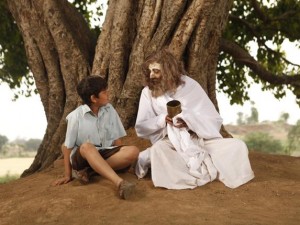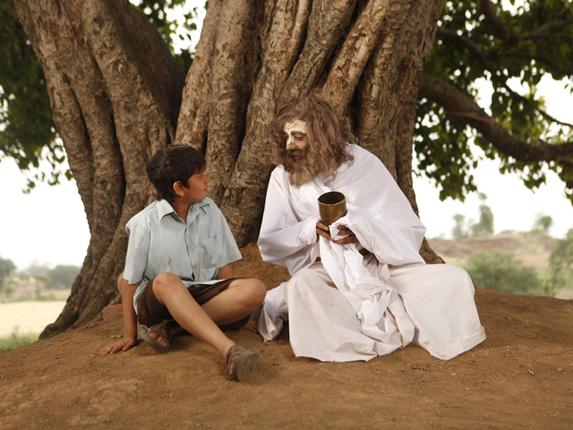Director: Krishan Hooda
Cast: Prince Shah, Shashank Singh, Mantra

The producer of this film – a biopic-ish account based on the early years (1938-1952) of Osho Rajneesh and his struggles to recognise his destiny – is a Swami from the famous Osho Pune commune named Jagdish Bharti. This need not necessarily be a sign that should make viewers wary. But this is: he is also the writer. He has written the screenplay, and the texbook-style dialogues that only seem to support a stubborn, singular, adoring view of a life.
That is to say, he is telling you a story the way he chooses to remember it, and not quite the way it happened. Biopics are generally dramatised version of events – but this is a cleansed, pure and PG-13 version of a controversial life that, by its end, was so much more than the mandatory “chosen one” exploration of spirituality. He wants you to recognise the greatness and divinity of his mentor and Guru right from his childhood, which, in turn, means that his young director – Krishan Hooda, who has demonstrated an original voice of his own in the past – is left with little choice.
It begins with an inquisitive child (Prince Shah) – who is living with his maternal grandparents in Madhya Pradesh – questioning the meaning and authority of everyone: From overzealous sages to villainous school-teachers (‘Kanter masters’). Naturally, he gravitates towards absorbing as much knowledge as possible, and formal education is beneath him. What follows is the guidance of soft-spoken librarians, a cautious father, and three Sadhu Babas at different points in his journey (played by the same actor, Mantra), as the child turns into a wise, gentle Amar Chitra Katha-ish hero (Shashank Singh).
Forever in search of Nirvana – the likes of which are accomplished by solo backpacking trips in jungles and mountains in these contemporary times – Raja finds himself becoming one with nature. That this enlightened soul later came to be known as “Rolls Royce Baba” in the West is a factoid never touched upon; the film terminates itself before adulthood, instead giving us a linear, simplistic version of events perhaps meant to be more of a meditative viewing experience than an actual film. In parts, it succeeds, because one ends up visualising soothing waterfalls and greenery (because none of it is found in Mumbai), but on the other hand, the filmmaker fails to add anything while translating it from paper to screen.
The whole point of moving pictures is defeated, as characters in Raja’s life range from wooden to fairytale avatars. Even if this were meant for impressionable young children to learn about history, the static, bland narrative leaves a lot to be desired.
Hooda does get to practice a style of storytelling – a slow, straightforward, moral-science-lesson mood and tone – that isn’t his cup of tea (or holy water), but he doesn’t seem totally comfortable with it. He struggles a bit with transitions between shots – or more specifically, the timing of his cuts (they’re intentionally longer than usual) – but excels somewhat in the placement of fairly folklore-ish songs, which seem to capture the essence of what the makers are trying to communicate. Other than Prince Shah and Mantra, everyone else seems to be fulfilling their duty as caricatures in a movie that is essentially thrives on the spirit of a docudrama.
At almost two hours, however, it tries too hard to sway its viewers, coming dangerously close to becoming just another propaganda-driven vehicle.
One would rather read about the man and his vast, inimitable life through entertaining accounts of his disciples’ experiences.
At one point, after observing faces during a movie screening, the child asks his nani if viewers are still the same people after watching a film as they were before it begins. Everything in between is not real, and the emptiness remains, he reasons.
This heightened sense of perspective rings true, ironically, for those who watch ‘Rebellious Flower’ too.





Leave A Comment
You must be logged in to post a comment.